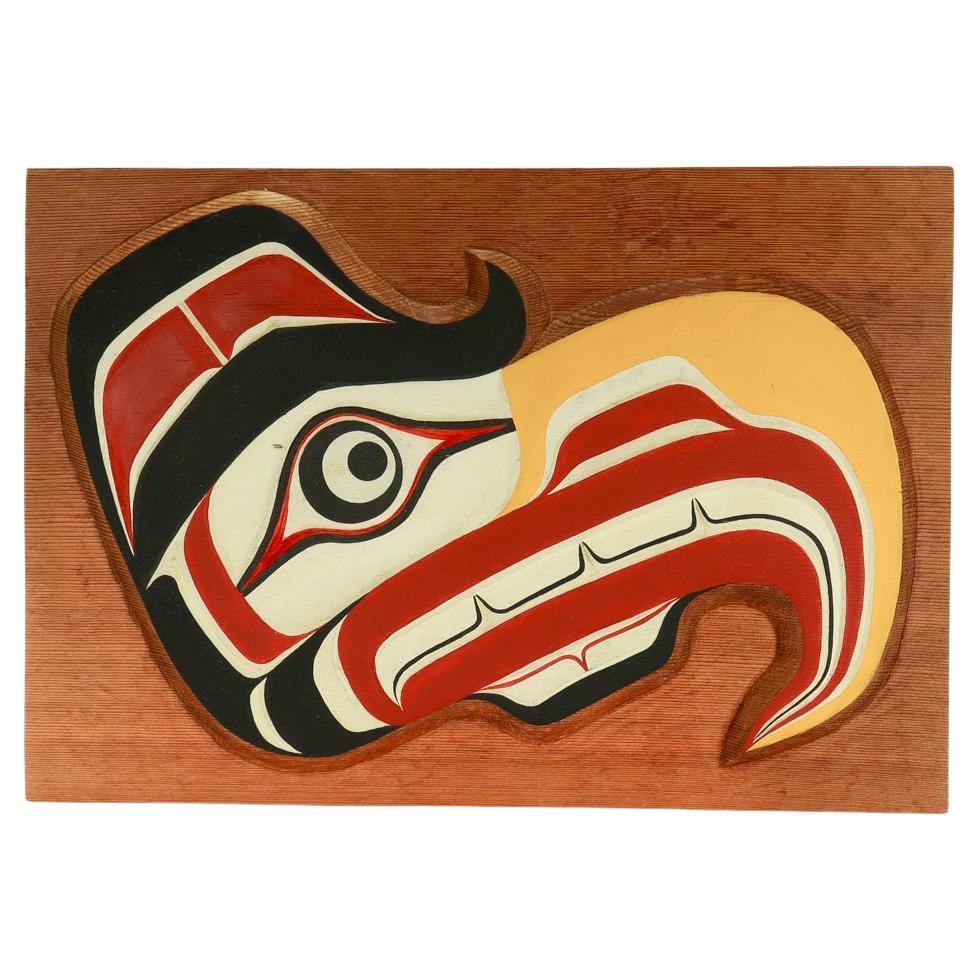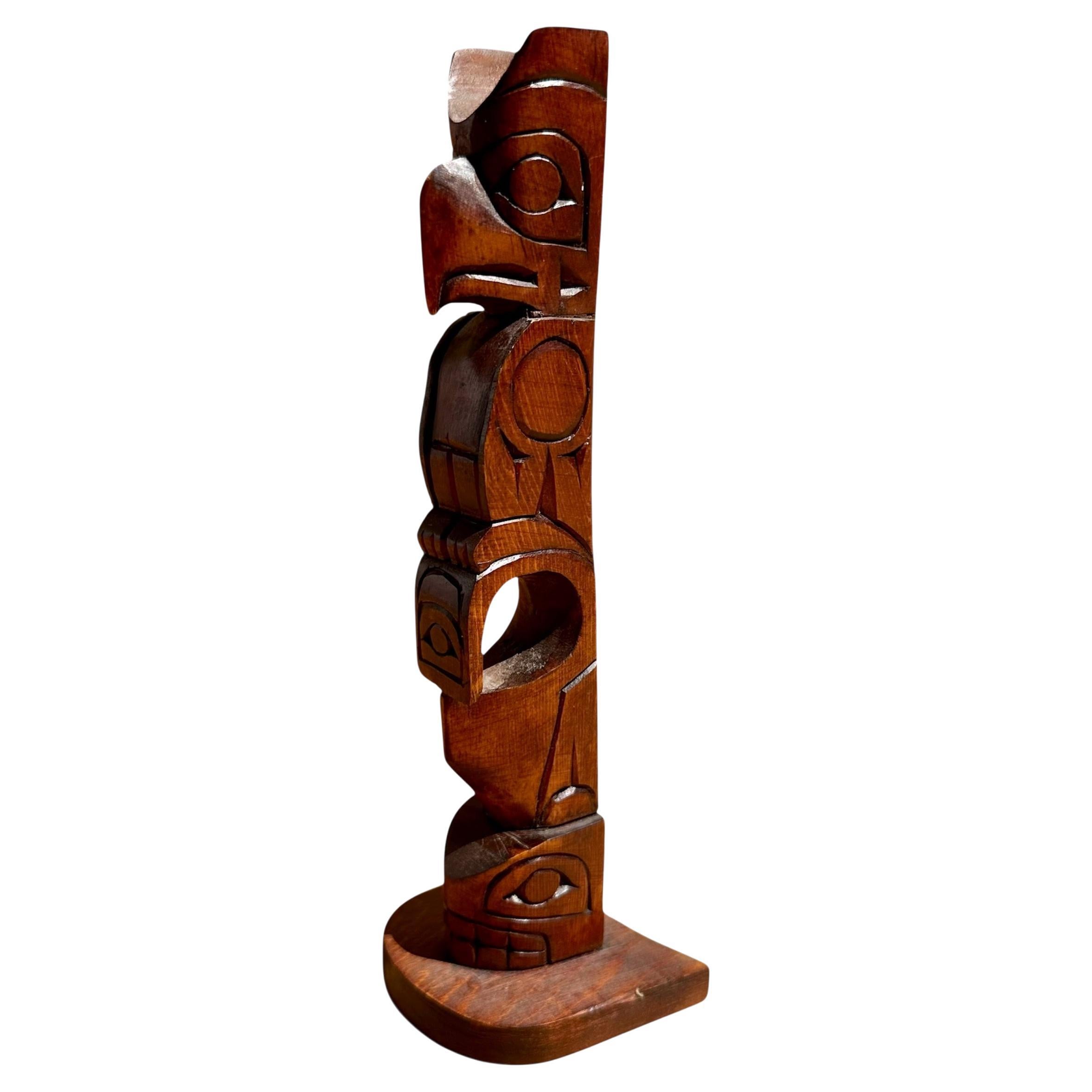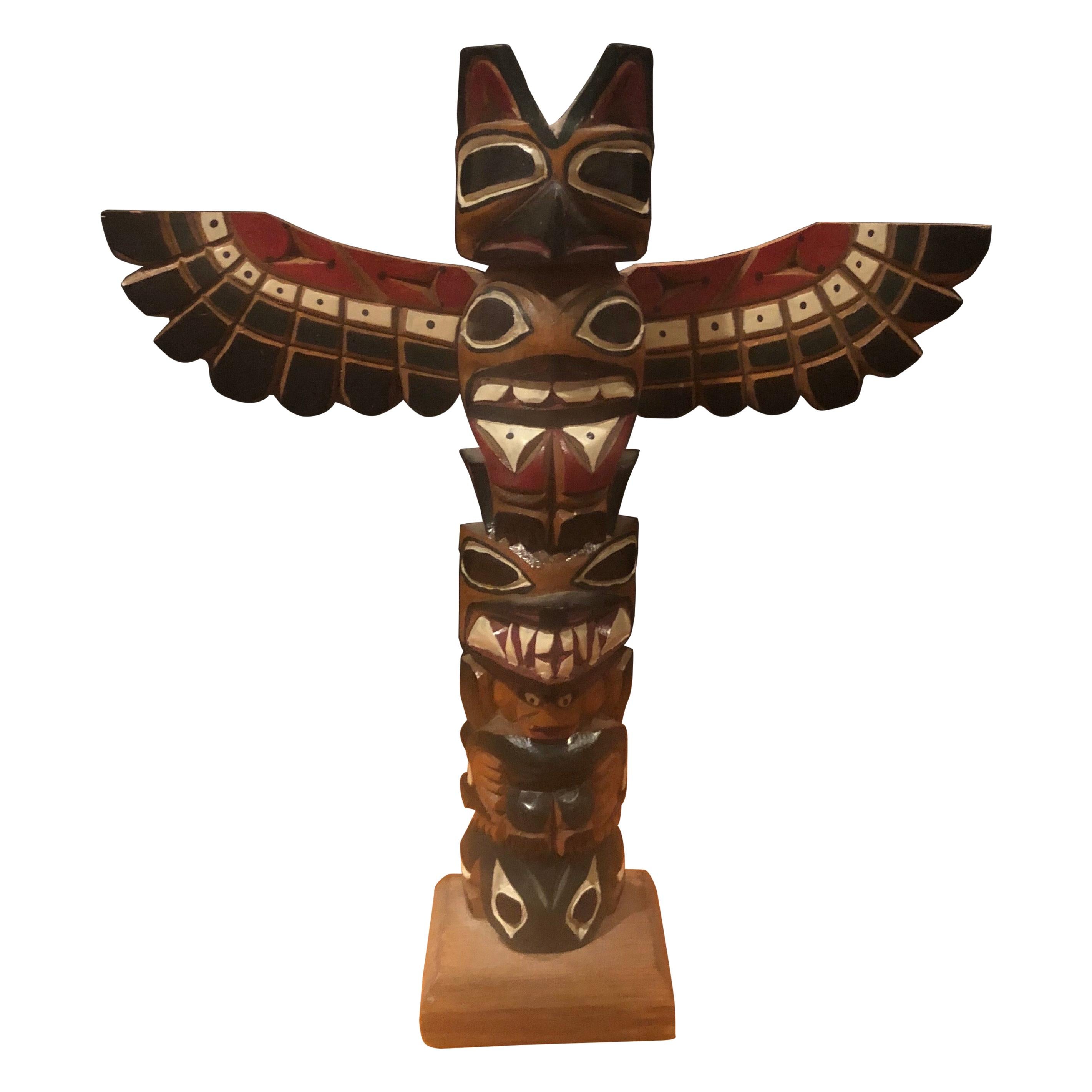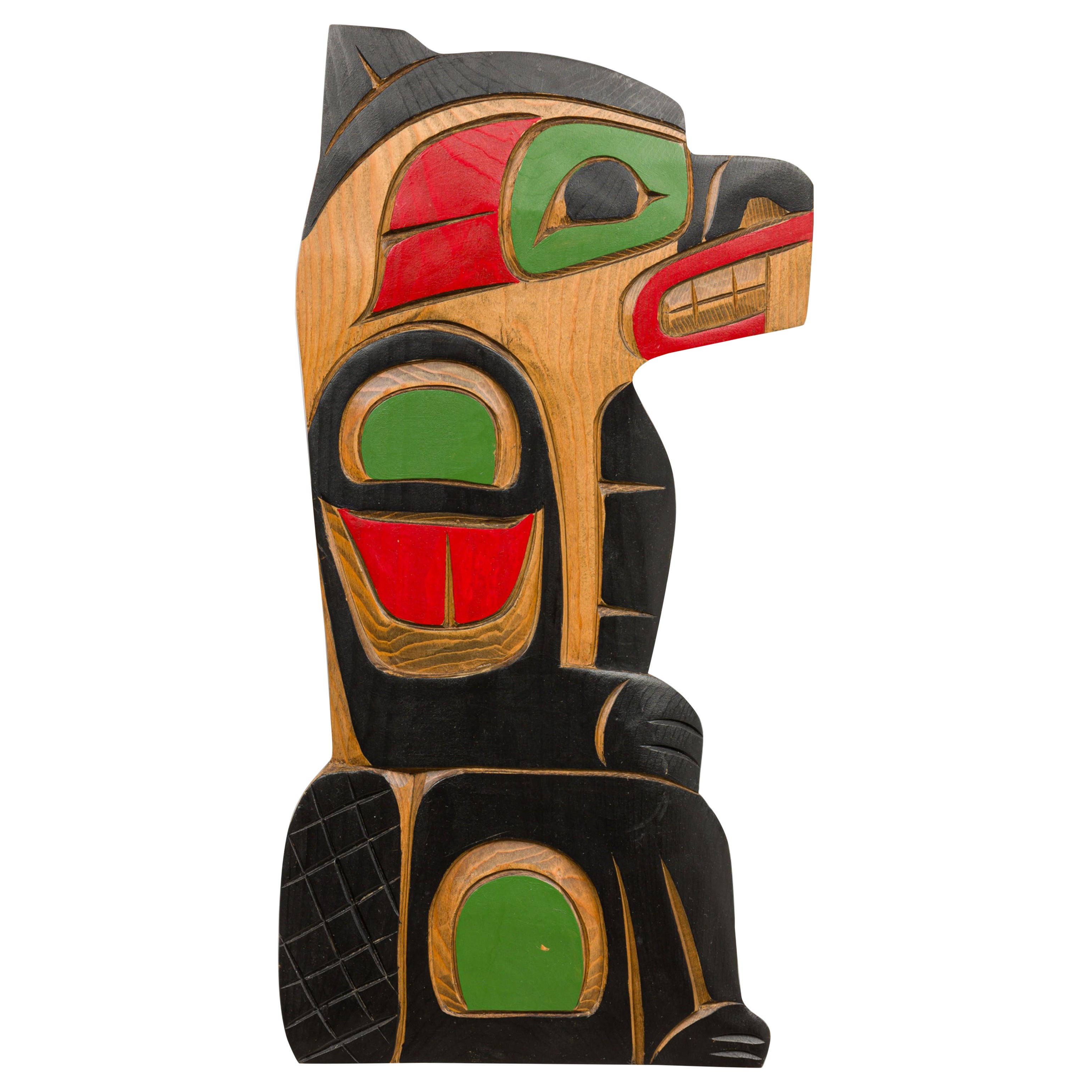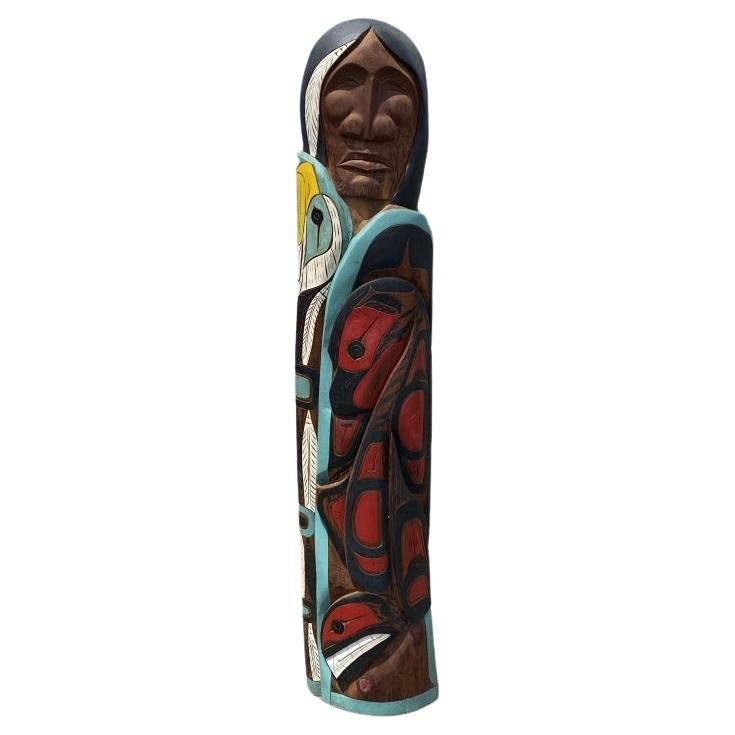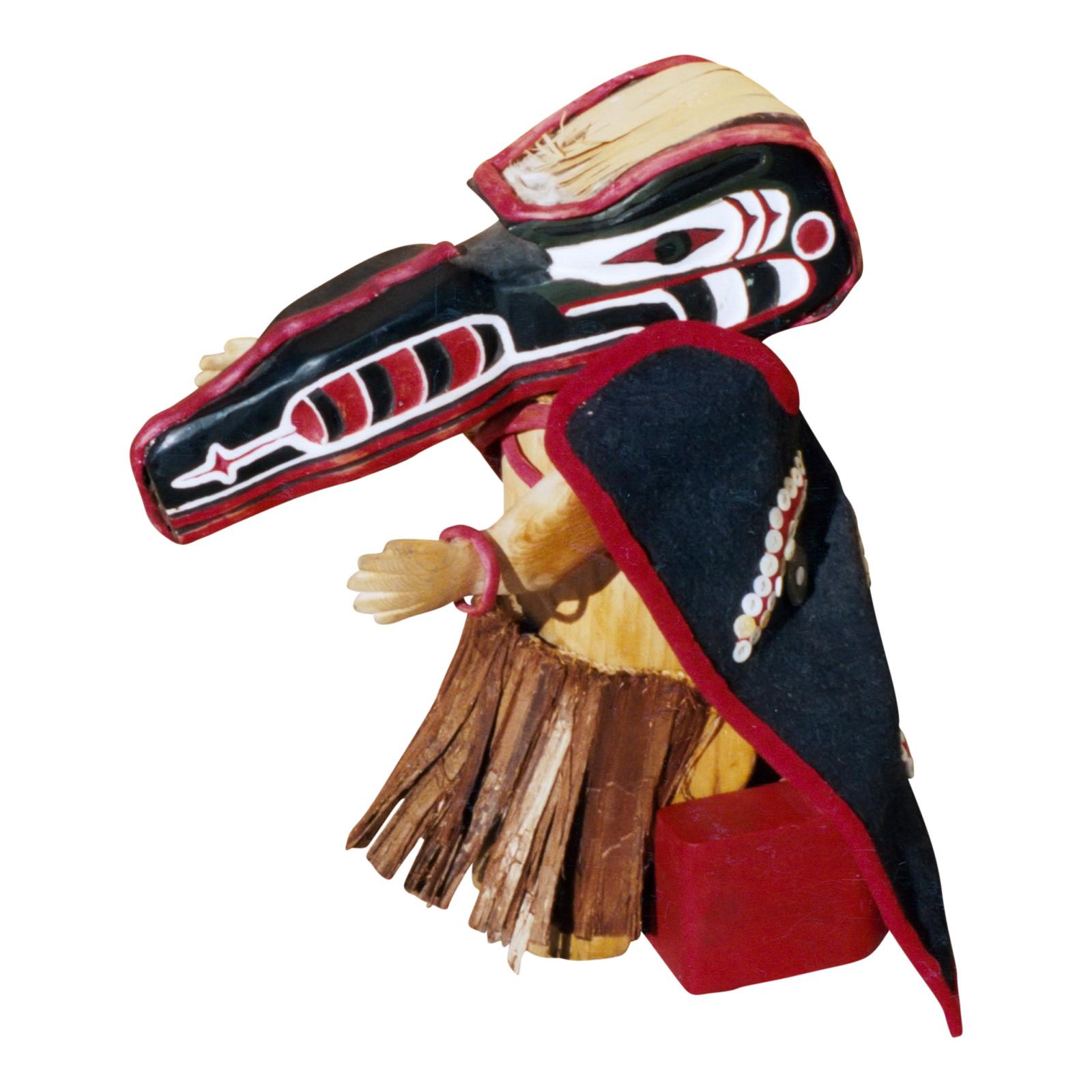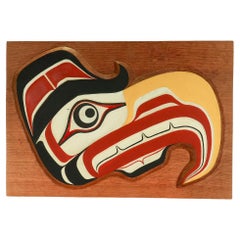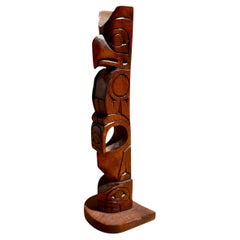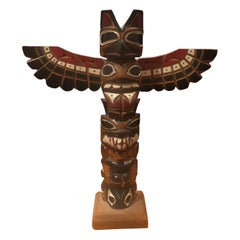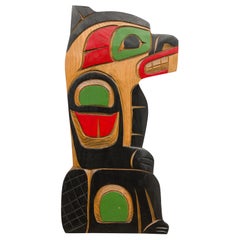Items Similar to Kwa-Giulth Thunderbird
Want more images or videos?
Request additional images or videos from the seller
1 of 6
Kevin CranmerKwa-Giulth Thunderbird1987
1987
$1,100
£841.71
€963.34
CA$1,553.49
A$1,688.38
CHF 904.82
MX$20,499.89
NOK 11,359.41
SEK 10,534.13
DKK 7,194.97
About the Item
This artwork titled "Kwa-Giulth, Thundrbird" 1987 is a wood carving bas-relief by Canadian artist Kevin Cranmer, b.1968 It is signed, titled and dated in pencil on the back by the artist. The size is 7.15 x 19.85 x 0.75 inches. It is in excellent condition.
About the artist:
Kevin Cranmer was born in Alert Bay, British Columbia, but has lived all but four years of his life in Victoria. Kevin can trace his ancestry to many tribes in the Kwa’kwaka’wakw nation.
Kevin’s first artistic experiences came as a small boy when he would accompany his father to Tony Hunt’s original Arts of the Raven Gallery. It was during these times, when he watched his father and other artists at work, that the seeds of interest were planted that would lead to the many artistic endeavors that would follow. Is formal instruction came under the tutelage of his cousin, George Hunt Jr. After a time, Kevin approached master carver Tony Hunt with whom he worked to further his understanding of traditional Kwagiulth design. His first carvings consisted of smaller pieces such as plaques, rattles, and figures before progressing to masks, feast dishes, and model poles. Kevin’s introduction to larger monumental sculpture began when he first started to work alongside renowned Nuu-chah-nulth artist Tim Paul in Thunderbird Park at the Royal British Columbia Museum.
Kevin’s credits include several large cooperative projects: a forty-foot pole, which stands in Stanley Park, Vancouver, a thirty foot pole on display at the Museum of Civilization in Ottawa and a thirty-six foot pole carved for the closing ceremonies at the 1990 Commonwealth Games in Auckland, New Zealand. The work of Kevin Cranmer is held in collections and museums worldwide.
- Creator:Kevin Cranmer (1968)
- Creation Year:1987
- Dimensions:Height: 7.15 in (18.17 cm)Width: 19.85 in (50.42 cm)Depth: 0.75 in (1.91 cm)
- Medium:
- Movement & Style:
- Period:
- Condition:
- Gallery Location:San Francisco, CA
- Reference Number:Seller: cranm/thun/011stDibs: LU66635205591
About the Seller
5.0
Platinum Seller
Premium sellers with a 4.7+ rating and 24-hour response times
Established in 1999
1stDibs seller since 2017
869 sales on 1stDibs
Typical response time: <1 hour
- ShippingRetrieving quote...Shipping from: San Francisco, CA
- Return Policy
More From This Seller
View AllSilent Hunter
Located in San Francisco, CA
This artwork titled "Silent Hunter" 2002 is an original color stonecut on beige Japan paper by noted Canadian/Inuit artist Kananginak Pootoogook, 1935-2010. It is hand signed, dated, titled, located, described and numbered 22/50 in pencil by the artist. The image size is 15 x 11.75 inches, framed size is 23.35 x 20 inches. Custom framed in a wooden dark green frame, with green matting. It is in excellent condition.
About the artist:
Kananginak Pootoogook was an Inuit sculptor and printmaker who lived in Cape Dorset, Nunavut, in Canada. He died as a result of complications related to surgery for lung cancer.
Pootoogook was born at a traditional Inuit camp called Ikerasak, near Cape Dorset, Nunavut (then in the Northwest Territories) to Josephie Pootoogook, leader of the camp, and Sarah Ningeokuluk. The family lived a traditional lifestyle hunting and trapping while living in an iglu in the winter and a sod house in the summer and did not move into their first southern style house until 1942. In 1957 Pootoogook married Shooyoo, moved to Cape Dorset and began work for James Houston.
Originally, Pootoogook did some carving, made prints and lithographs for other artists. At the same time he was a leader in setting up the West Baffin Eskimo Co-operative, the first Inuit owned co-op, now part of the Arctic Co-operatives Limited and served from 1959 until 1964 as the president. Although Kananginak had worked with his father, Josephie, in 1959, it was not until the 1970s that Kananginak began work as a full-time artist producing drawings, carvings and prints. According to Terry Ryan, former Co-op manager, Pootoogook was both influenced by and an admirer of the works of his uncle, photographer and historian Peter Pitseolak.
The World Wildlife Commission released a limited edition set in 1977 that included four of Pootoogook's images and in 1980 he was elected to the Royal Canadian Academy of Arts. In 1997 Pootoogook built a 6 ft (1.8 m) inukshuk in Cape Dorset for former Governor General of Canada, Roméo LeBlanc. The inukshuk was dismantled and shipped to Ottawa and with the assistance of his son, Johnny, it was rebuilt at Rideau Hall and unveiled on 21 June, National Aboriginal Day.
Pootoogook had several exhibitions and showings of his work. In 2010, he went to Vancouver for the 2010 Winter Olympics and to open a showing of his work at the Marion Scott Gallery. He also had a showing of his work, his first solo exhibition at a public institution, at the Museum of Inuit Art in Toronto from February to May 2010. He also received a 2010 National Aboriginal Achievement Award in the arts category from the National Aboriginal Achievement Foundation.
While working on his final, and unfinished, drawing of a Peterhead owned by his father, he was struck by coughing spells, which he declared was cancer. Along with his wife, Shooyoo, he flew to Ottawa, staying at the Larga Baffin home, and was diagnosed with lung cancer. In October 2010, he underwent surgery and did not recover. He died 23 November 2010 in Ottawa. The work of Kananginak Pootoogook is held in numerous collections and museums, includingThe McCord Museum, the Dallas Museum of Art, Musee National des Baux Arts...
Category
Late 20th Century Other Art Style Figurative Prints
Materials
Other Medium
American Indian Navajo
By Ozz Franca
Located in San Francisco, CA
This artwork "American Indian, Navajo" is a offset lithograph on paper by noted Brazilan artist Ozz Franca, 1928-1991. The image size is 21 x 14.75 inches, framed size is 31.25 x 27 inches. Custom framed in a wooden brown/grey frame, with lith purple matting. It is in excellent condition.
About the artist:
Born October 2, 1928, França (pronounced FRON-suh) grew up in Sao Paulo, Brazil, and from an early age showed talent as an artist, as well as exceptional prowess as a competitive swimmer. At 14 he won first prize at the annual Spring Salon Art Competition. At 15, he qualified for the Brazilian Olympic Swimming Team. With two amazing talents, França was unsure what he should do with his life. Fate stepped in, and the Olympic Games were canceled the year França was to compete due to the outbreak of World War II. At that point, he decided to devote his life to art.
He held his first one-man show at the age of 18. Following what he would later say was the best advice anyone ever gave him, França came to the U.S, to accept a scholarship in Utah. A year later, he moved to Hollywood and began doing movie illustration for Walt Disney. His projects included Lady and the Tramp and 20,000 Leagues Under the Sea. He moonlighted as a swimmer when movie parts were available.
França painted many subjects, but he is best known for his esoteric images of Native American women. França's art enters the world of fantasy and dreams, where the spiritual meets the sensual. His works, with their floating imagery and airy, muted colors, evoke an aura of mystery. França said he always painted his subjects, which primarily were women, either in profile, looking toward the edge of the painting, or looking over her shoulder, "so that anyone could walk into it."
Joan Lee, print marketing professional, said that Ozz saw the spirituality and quiet dignity of Native American men and women. "there's a romance surrounding Native Americans that people appreciate seeing," said Lee.
Ozz França died in 1991.
Ozz Franca’s work is held in the collections of numerous celebrity, including:
Jacqueline Onassis
Lyndon B. Johnson
Patty Duke
Jerry Lewis
Kim Novak
Burt Lancaster
Gig Young
Tom Bradley
Sammy Davis, Jr.
Ronald Reagan
Red Skelton...
Category
Late 20th Century Realist Figurative Prints
Materials
Lithograph
Intrepid Caribou
Located in San Francisco, CA
This artwork titled "Intrepid Caribou" 2002 is an original color stone cut on Japan paper by noted Canadian/Inuit artist Kananginak Pootoogook, 1935-2010. It is hand signed, dated, titled, located, described and numbered 22/50 in pencil by the artist. The image size is 18.5 x 12.5 inches, sheet size is 23 x 16 inches, framed size is 24.85 x 29.65 inches. Custom framed in a black metal frame, with black matting. It is in excellent condition.
About the artist:
Kananginak Pootoogook was an Inuit sculptor and printmaker who lived in Cape Dorset, Nunavut, in Canada. He died as a result of complications related to surgery for lung cancer.
Pootoogook was born at a traditional Inuit camp called Ikerasak, near Cape Dorset, Nunavut (then in the Northwest Territories) to Josephie Pootoogook, leader of the camp, and Sarah Ningeokuluk. The family lived a traditional lifestyle hunting and trapping while living in an iglu in the winter and a sod house in the summer and did not move into their first southern style house until 1942. In 1957 Pootoogook married Shooyoo, moved to Cape Dorset and began work for James Houston.
Originally, Pootoogook did some carving, made prints and lithographs for other artists. At the same time he was a leader in setting up the West Baffin Eskimo Co-operative, the first Inuit owned co-op, now part of the Arctic Co-operatives Limited and served from 1959 until 1964 as the president. Although Kananginak had worked with his father, Josephie, in 1959, it was not until the 1970s that Kananginak began work as a full-time artist producing drawings, carvings and prints. According to Terry Ryan, former Co-op manager, Pootoogook was both influenced by and an admirer of the works of his uncle, photographer and historian Peter Pitseolak.
The World Wildlife Commission released a limited edition set in 1977 that included four of Pootoogook's images and in 1980 he was elected to the Royal Canadian Academy of Arts. In 1997 Pootoogook built a 6 ft (1.8 m) inukshuk in Cape Dorset for former Governor General of Canada, Roméo LeBlanc. The inukshuk was dismantled and shipped to Ottawa and with the assistance of his son, Johnny, it was rebuilt at Rideau Hall and unveiled on 21 June, National Aboriginal Day.
Pootoogook had several exhibitions and showings of his work. In 2010, he went to Vancouver for the 2010 Winter Olympics and to open a showing of his work at the Marion Scott Gallery. He also had a showing of his work, his first solo exhibition at a public institution, at the Museum of Inuit Art in Toronto from February to May 2010. He also received a 2010 National Aboriginal Achievement Award in the arts category from the National Aboriginal Achievement Foundation.
While working on his final, and unfinished, drawing of a Peterhead owned by his father, he was struck by coughing spells, which he declared was cancer. Along with his wife, Shooyoo, he flew to Ottawa, staying at the Larga Baffin home, and was diagnosed with lung cancer. In October 2010, he underwent surgery and did not recover. He died 23 November 2010 in Ottawa. The work of Kananginak Pootoogook is held in numerous collections and museums, includingThe McCord Museum, the Dallas Museum of Art, Musee National des Baux Arts...
Category
Late 20th Century Other Art Style Figurative Prints
Materials
Other Medium
The Drummer
Located in San Francisco, CA
This artwork titled "The Drummer" 1993 is an original color lithograph on Wove paper by noted Canadian/Inuit artist Kananginak Pootoogook, 1935-2010. It is hand signed, dated, titled, located, described and numbered 31/50 in pencil by the artist. The image size is 22 x 15.5 inches, sheet size is 30 x 22.5 inches, framed size is 39.5 x 31.5 inches. Custom framed in a dark wood frame, with off white backing. The artwork is in excellent condition, the frame has minor restorations and very light dents, barely visible.
About the artist:
Kananginak Pootoogook was an Inuit sculptor and printmaker who lived in Cape Dorset, Nunavut, in Canada. He died as a result of complications related to surgery for lung cancer.
Pootoogook was born at a traditional Inuit camp called Ikerasak, near Cape Dorset, Nunavut (then in the Northwest Territories) to Josephie Pootoogook, leader of the camp, and Sarah Ningeokuluk. The family lived a traditional lifestyle hunting and trapping while living in an iglu in the winter and a sod house in the summer and did not move into their first southern style house until 1942. In 1957 Pootoogook married Shooyoo, moved to Cape Dorset and began work for James Houston.
Originally, Pootoogook did some carving, made prints and lithographs for other artists. At the same time he was a leader in setting up the West Baffin Eskimo Co-operative, the first Inuit owned co-op, now part of the Arctic Co-operatives Limited and served from 1959 until 1964 as the president. Although Kananginak had worked with his father, Josephie, in 1959, it was not until the 1970s that Kananginak began work as a full-time artist producing drawings, carvings and prints. According to Terry Ryan, former Co-op manager, Pootoogook was both influenced by and an admirer of the works of his uncle, photographer and historian Peter Pitseolak.
The World Wildlife Commission released a limited edition set in 1977 that included four of Pootoogook's images and in 1980 he was elected to the Royal Canadian Academy of Arts. In 1997 Pootoogook built a 6 ft (1.8 m) inukshuk in Cape Dorset for former Governor General of Canada, Roméo LeBlanc. The inukshuk was dismantled and shipped to Ottawa and with the assistance of his son, Johnny, it was rebuilt at Rideau Hall and unveiled on 21 June, National Aboriginal Day.
Pootoogook had several exhibitions and showings of his work. In 2010, he went to Vancouver for the 2010 Winter Olympics and to open a showing of his work at the Marion Scott Gallery. He also had a showing of his work, his first solo exhibition at a public institution, at the Museum of Inuit Art in Toronto from February to May 2010. He also received a 2010 National Aboriginal Achievement Award in the arts category from the National Aboriginal Achievement Foundation.
While working on his final, and unfinished, drawing of a Peterhead owned by his father, he was struck by coughing spells, which he declared was cancer. Along with his wife, Shooyoo, he flew to Ottawa, staying at the Larga Baffin home, and was diagnosed with lung cancer. In October 2010, he underwent surgery and did not recover. He died 23 November 2010 in Ottawa. The work of Kananginak Pootoogook is held in numerous collections and museums, includingThe McCord Museum, the Dallas Museum of Art, Musee National des Baux Arts...
Category
Late 20th Century Other Art Style Figurative Prints
Materials
Lithograph
Speaks with Forked Tongue
By Gordon Phillips
Located in San Francisco, CA
This artwork titled "Speaks with a forked tongue" c. 1970, is a bronze sculpture by renown American Western artist Gordon Dale Phillips, 1927-2011. It is signed and numbered 37/40 on...
Category
Late 20th Century American Realist Figurative Sculptures
Materials
Bronze
Biachee-Itdah Bah Achbeb
Located in San Francisco, CA
This artwork titled " Biachee-Itdah Bah Achbeb" 1990 is a color offset lithograph on Artcote paper by Crow Indian artist Penni Anne Cross A.K.A. (Alaw...
Category
Late 20th Century Realist Figurative Prints
Materials
Lithograph
You May Also Like
Vintage Pacific Northwest Coast Native Wooden Hawk Carving by William Wasden Jr
Located in Philadelphia, PA
A fine vintage Pacific Northwest Native wooden carving.
The carving in the form of an hawk with red, black, white, and yellow tones set on a brown wooden board.
By William Wasden Jr.
Wasden was trained from a very young age in numerous artistic practices of the Kwakwa̱ka̱’wakw peoples including carving, jewelrymaking, and printing. As a high schooler, he began focusing primarily on preserving traditional singing after hearing his grandfather perform. Wasden currently teaches singing in Alert Bay on Cormorant Island, British Columbia. He also heads the Gwa'wina Dancer's Cultural Society, whose mission is to spread authentic Kwakwa̱ka̱’wakw culture & teachings.
In Kwakwaka'wakw art, human faces are placed strategically on animal carvings to indicate the creature's supernatural ability to transform into a human form. Kwakwaka'wakw origin myths say that their ancestors were originally animals of various kinds who discarded their animal forms and transformed into humans.
Simply a wonderful piece of Pacific Northwest Native art...
Category
20th Century American Native American Decorative Art
Materials
Wood
Vintage Cedar Wood Totem Kwakiutl Eagle.
Located in Vero Beach, FL
Vintage Wooden Totem Kwakiutl Eagle Cedar Wood.
Early 20th Century hand carved cedar wood totem of a Kwakiutl eagle. It is created by a Native artist ...
Category
Early 20th Century American Tribal Tribal Art
Materials
Cedar
Nuu-chah-nulth Northwest Coast Hand Carved Wood TOTEM Pole by Ray Williams
Located in San Diego, CA
A fine example attributed to master Nuu-chah-nulth carver Ray Williams, circa 1960s. Ray Williams was the son of famed carver Sam Williams who started car...
Category
Mid-20th Century Canadian Native American Native American Objects
Materials
Wood, Paint
$600 Sale Price
20% Off
American Mid-Century Carved And Painted Kwakiutl Wall Plaque of a Beaver
Located in Queens, NY
Vintage Native American carved and painted Kwakiutl wall plaque of a beaver (signed: GEORGE MATILPI-1972)
Category
Mid-20th Century American Mid-Century Modern Wall-mounted Sculptures
Materials
Paint
Lance Joseph (Squamish, Salish B. 1957) Carved & Hand Painted Figural Column
Located in Bridgeport, CT
A strongly carved Figural Column by noted Coast Salish artist, Lance Joseph Joseph was born in 1957 in Vancouver, British Columbia, Canada. This carved figural totem, larger than l...
Category
21st Century and Contemporary Canadian Native American Tribal Art
Materials
Wood
Northwest Coast Wooden Doll with Thunderbird, Eagle Mask
Located in Coeur d'Alene, ID
Seated figure with Thunderbird mask; carved yellow cedar, Thunderbird mask (eagle) depicted as head on a seated human body. Arms are dramatically open and outstretched. Large, richly detailed Thunderbird Mask, permanently attached with oblong eyes painted red, black and white. Edge decorated with dyed (red) spruce root as simulated mask harness over shoulders and across the chest. Dance apron; Seated figure wearing an apron of shredded cedar bark. Held on to figure at the waist with woven cedar string and abalone shell on button at back. Approximately 7" wide/long by 4" high. Bench; carved from cedar. Decorated on the back with bear face, outlined with inlaid red dyed spruce root. Ears, eyebrows and nose of inlaid abalone shell. Eyes of inlaid fossilized ivory...
Category
Vintage 1920s American Native American Native American Objects
Materials
Cedar
More Ways To Browse
Carved Pole
Nuu Chah Nulth
Mark Catesby Antique Prints
Master Apollo
Matterhorn Poster
Max Gimblett
Meyer Claus
Michel Debieve
Millet Oil Painting
Mississippi River Art
Monet Drawings
Monhegan Island Painting
Montmartre Vintage Posters
Morris Davidson
Mourne Mountains
Nancy Richardson
New Hope School Paintings
New Mexico Taos Pueblo
